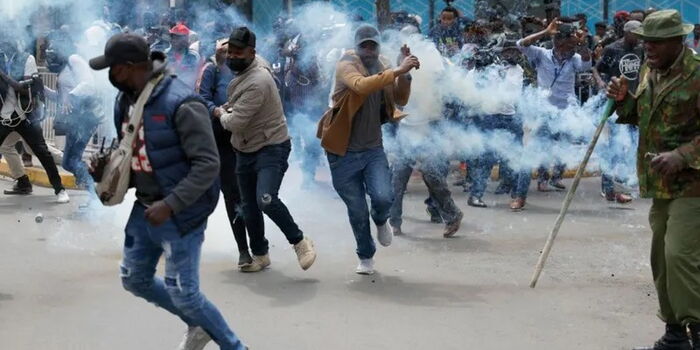Manyatta Member of Parliament, Gitonga Mukunji, has called on the government to respond urgently to the British Broadcasting Corporation (BBC) documentary by not only investigating the matter but also producing its own detailed documentary about what happened during the Gen Z protests last year.
While speaking at a public event on Monday, April 28, Mukunji criticized the government, describing it as “shameful” that international media outlets are doing thorough investigations into the protests while the government remains silent and unwilling to conduct serious inquiries.
“I strongly condemn the fact that up to now, there has been no proper investigation to uncover who exactly was responsible for the deaths of the young people during the protests,” Mukunji stated.
“I urge the government that if they have a different version of events from what the BBC is showing, they should be able to document it and release it to the public,” he added.
Mukunji further expressed disappointment that Kenyans had to rely on a foreign media outlet like the BBC to get detailed information about the tragedy.
“It is painful that we must wait for the BBC to produce such a documentary before any serious discussion or accountability begins.
When those young people marched to Parliament, they were standing up for the rights of every Kenyan,” he emphasized.
The MP also stressed that the government must take responsibility by compensating the families who lost their loved ones during the demonstrations.
He pointed out that the youths were exercising their constitutional rights, and their killing was a grave violation of human rights.
“The government must move swiftly to compensate the families of those who lost their children during the protests.
Killing young men and women who were simply demanding their rights in a peaceful manner was inhumane and unconstitutional,” Mukunji said.
His remarks came just hours after the BBC aired a shocking exposé titled “Blood Parliament,” which shed new light on the events of the June 25, 2024, anti-Finance Bill protests that tragically led to the deaths of over 60 people.
The BBC documentary revealed disturbing details, showing that security forces, including officers from the Kenya Defence Forces (KDF), were involved in the shootings that resulted in the deaths of at least three protestors.
Their investigation involved analysing more than 5,000 images and videos from the protests.
Following the documentary’s release, many Kenyans, especially those who participated in the protests, took to social media to express their outrage, sorrow, and painful memories of losing their fellow protestors.
“The BBC documentary really hit hard. I’m deeply hurt. This government doesn’t stand with its people at all,” one user posted on X (formerly Twitter), reflecting the mood of many Kenyans online.
However, not everyone supported the BBC’s move. Some politicians criticized the international broadcaster, accusing it of trying to incite unrest in the country.
Homa Bay Town MP Peter Kaluma, in a statement issued on Monday, April 28, said that the government should go as far as banning the BBC from operating in Kenya.
Kaluma argued that the media plays a powerful role in shaping democracies and must exercise responsibility.
“We must ban the BBC in Kenya. Media has the power to either build a democracy or tear down a stable nation.
Let’s not forget, the mass killings in Rwanda were fuelled by reckless media coverage,” Kaluma warned, emphasizing the dangers of irresponsible journalism.
Join Our Political Forum official 2025 WhatsApp Channel To Stay Updated On time https://whatsapp.com/channel/0029VaWT5gSGufImU8R0DO30


